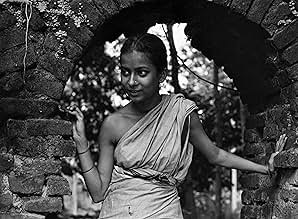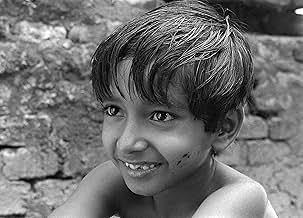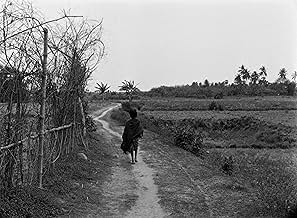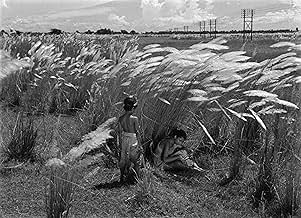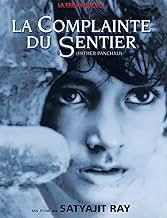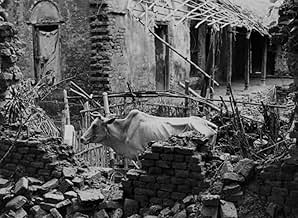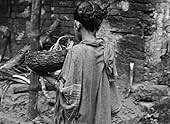CALIFICACIÓN DE IMDb
8.2/10
41 k
TU CALIFICACIÓN
Apu y su familia viven en la pobreza. Su padre Harihar sueña con una vida mejor para su familia y emprende un viaje fuera de su pueblo en Bengal para buscar trabajo. Pero en su ausencia ocur... Leer todoApu y su familia viven en la pobreza. Su padre Harihar sueña con una vida mejor para su familia y emprende un viaje fuera de su pueblo en Bengal para buscar trabajo. Pero en su ausencia ocurre una tragedia.Apu y su familia viven en la pobreza. Su padre Harihar sueña con una vida mejor para su familia y emprende un viaje fuera de su pueblo en Bengal para buscar trabajo. Pero en su ausencia ocurre una tragedia.
- Dirección
- Guionistas
- Elenco
- Nominada a1 premio BAFTA
- 11 premios ganados y 3 nominaciones en total
Kanu Bannerjee
- Harihar Ray
- (as Kanu Bandyopadhyay)
Karuna Bannerjee
- Sarbojaya Ray
- (as Karuna Bandopadhyay)
Subir Banerjee
- Apu Ray
- (as Subir Bandopadhyay)
Uma Das Gupta
- Durga
- (as Uma Dasgupta)
Runki Banerjee
- Little Durga
- (as Runki Bandopadhyay)
Haren Banerjee
- Chinibas, Sweet-seller
- (as Haren Bandyopadhyay)
Roma Ganguli
- Roma
- (as Rama Gangopadhyay)
Binoy Mukherjee
- Baidyanath Majumdar
- (as Binoy Mukhopadhyay)
- Dirección
- Guionistas
- Todo el elenco y el equipo
- Producción, taquilla y más en IMDbPro
Opiniones destacadas
"Pather Panchali", Satyajit Ray's debut film about life in a Bengali village, was the first movie from India to gain wide recognition and acclaim in the west. It is an affecting story of a rural family struggling to deal with poverty and tragedy in their ancestral home. Ray adapted the script from Bibhuti Bihushaw Banerjee's semi-autobiographical novel of the same title and retells it with natural beauty and a quiet perspective. The filmmaker, who came from a literary and artistic background(He was a product of the Indian Renaissance) was interested in the contemporary problems of his country-and he shared with the Neorealist films from Italy- a simple and direct approach to making movies. Ray created ordinary scenes that were incredibly life-like. His films contained very few strains of artifice. He believed that the raw material of cinema was life itself. Ray generally concentrated on small subjects and ordinary people. He favored using non-actors and shooting on location to heighten the realism. He made films in his own style; dignified and subtle; sincere and with a conscience. In "Pather Panchali" (Song of the Little Road") Ray makes superb use of his milieu. The viewer immediately feels the cramped conditions of the families' decaying house and the open-air confines of the surrounding forest. When Ray sends his camera beyond the village, the observer can sense the allure and freedom of the vast fields that spring immodestly from a thin, winding trail. Rays' was a cinema of thought and feeling, in which emotion was deliberately restrained because it is so strong. This restraint adds to the psychological intensity in his work. Nearly all of his films are marked by this remarkable depth of feeling. "Pather Panchali", the first installment of the Apu Trilogy("Aparajito" and "The World of Apu" would follow) depicts a young boy (Apu) exploring his ever-expanding universe with a growing sense of wonder. Ray excelled at showing how children and adolescents confront mystery and joy; sadness and death. The director shows Apu's burgeoning awareness with a masterful use of the long shot. High-angled, distant shots track Apu and his older sister Durga, as they run spiritedly through white-kashed fields. This sense of discovery gives the film it's emotional power. The director's main subject was India-it's customs and culture. It's conflicts between the traditional way of life and the impact and influence of the West. He tried arduously to capture this synthesis between western ideas and traditional Hindu values. His concern for human problems and not issues of national politics gave his films universal appeal. "Pather Panchali" delineates the small joys and acute sorrows of a poor Indian family. It is an endearing testament that poverty does not nullify love and that even the most afflicted person can find some modest pleasures in their world. The film's indigenous sound track is vital to Ray's story of ancestral limitations. Twanging ektaras, wailing tarshehnais and six-stringed sitars resound liberally throughout the movie. It would be difficult to imagine "Pather Panchali" without it's memorable score. Satyajit Ray was an unpretentious filmmaker. He was genuinely uninterested in commercial considerations. His films were life-affirming, authentic and honest; gentle and poetic- truthful observations on human behavior that employed simple but strong themes. Ray's unadorned style of film-making was intimate, probing, and revealing. (Possible spoiler) The final scene shows the grieving family leaving their home in an ox-driven carriage to begin a new life. A trailing camera in medium close-up captures a compelling mixture of emotions on their faces. Expressions of pain and resolution; hope and despair; the future and the past. A seemingly simple yet unmistakably powerful scene that typifies Satyajit Ray's profound cinema. A cinema of gentle but deep observation, understanding and unabashed love of the human race.
This film is based on the the Bengali novel "Pather Panchali" by Bibhutibhushan Bandyopadhyay. It is hard to believe Satyajit Ray made his directorial debut with this film. The movie itself is the evidence what Satyajit Ray was capable of. Story is simple but the things that make the film great are its soulful scenes without using dialogues, camera work technically very much ahead of its time and the background score by Pandit Ravi Shankar setting the tone for the movie. The style of detailings used in this film help us to connect with the film. Cinematography and believable acting are the strength of this film. No wonder why Martin Scorsese was a great admirer of Satyajit Ray's work.
This is a tour de force around a family's quest for that better future amidst sheer poverty. The film's success is not limited only to realistic depiction of human condition in early 20th century Bengal, but it brings up the triumph of human spirit, love and affection in spite of utter struggle in the most poignant way that one may think. Anybody remotely connected with movie making should also watch APARAJITO AND APUR SANSAR, to complete the experience, and off course to understand the art and craft of cinematic expression from the Maestro. No doubt it ranks in top 100 movie list from Time magazine, not to speak of almost all Indian publications connected with films rate this one as THE MOVIE.
10sumanta6
The film is certainly a masterpiece. The film is overwhelmingly real and the key element in the movie is the maintenance of this realism. The characters are so true to the ethnic rural-sixties Indian existence that one is compelled to wonder if the film was captured through surveillance cameras.
Pather Panchali, released in 1955, is the first film of director Satyajit Ray's Apu trilogy. The film is a serene and beautiful depiction of a little boy's childhood in the Indian countryside in the 1950s.The film was made on a shoestring budget by a hitherto unknown director. Apart from a seventy-year-old woman who made her name in the 1930s on the stage, none of the cast had ever acted before and many had been plucked from the Indian rurality. In contrast Satyajit Ray completed the trilogy on the behest of the Indian Prime Minister, pointing to the film's cultural impact.
It's a quiet, simple tale, centering on the life of a small family living in a rural village in Bengal. The father, Harihar (Kanu Bannerjee), is a priest and poet who cares more about his writing and spiritual welfare than obtaining wages he is owed. The mother, Sarbojaya (Karuna Bannerjee), worries that her husband's financial laxity will leave her without enough food for her two children, daughter Durga (Uma Das Gupta) and son Apu (Subir Bannerjee). Harihar's family often lives on the edge of poverty, coping with the unkind taunts of their neighbors, the burden of caring for an aging aunt (Chunibala Devi), and the terrible aftermath of a natural catastrophe.
Most of what transpires is shown through the eyes of either Sarbojaya or Durga, and, as a result, we identify most closely with these two. Harihar is absent for more than half of the movie, and, before the penultimate scene, Apu is a mere witness to events, rather than a participant. Until the closing moments, we don't get a sense of the young boy as a fully formed individual, since he's always in someone else's shadow.
The simple story of the Bengali family will definitely stay in my heart for a long time to come. If you haven't seen it yet, what are you waiting for?........
Pather Panchali, released in 1955, is the first film of director Satyajit Ray's Apu trilogy. The film is a serene and beautiful depiction of a little boy's childhood in the Indian countryside in the 1950s.The film was made on a shoestring budget by a hitherto unknown director. Apart from a seventy-year-old woman who made her name in the 1930s on the stage, none of the cast had ever acted before and many had been plucked from the Indian rurality. In contrast Satyajit Ray completed the trilogy on the behest of the Indian Prime Minister, pointing to the film's cultural impact.
It's a quiet, simple tale, centering on the life of a small family living in a rural village in Bengal. The father, Harihar (Kanu Bannerjee), is a priest and poet who cares more about his writing and spiritual welfare than obtaining wages he is owed. The mother, Sarbojaya (Karuna Bannerjee), worries that her husband's financial laxity will leave her without enough food for her two children, daughter Durga (Uma Das Gupta) and son Apu (Subir Bannerjee). Harihar's family often lives on the edge of poverty, coping with the unkind taunts of their neighbors, the burden of caring for an aging aunt (Chunibala Devi), and the terrible aftermath of a natural catastrophe.
Most of what transpires is shown through the eyes of either Sarbojaya or Durga, and, as a result, we identify most closely with these two. Harihar is absent for more than half of the movie, and, before the penultimate scene, Apu is a mere witness to events, rather than a participant. Until the closing moments, we don't get a sense of the young boy as a fully formed individual, since he's always in someone else's shadow.
The simple story of the Bengali family will definitely stay in my heart for a long time to come. If you haven't seen it yet, what are you waiting for?........
What a wonderful film. For those who have not watched any films from India or heard of Ray, I strongly recommend it. Full of sadness, hope, innocence, and despair, it is an emotionally evocative portrait of the life of an Indian family, their trials, and their courage and persistence throughout. They go on, not because they are exceptional, but because they must, because they are human.
Ray does a masterful job of capturing the simple joys of childhood, and the ambitions and dreams which make us all human, regardless of where we are. Simple scenes such as a disfigured elderly woman seated on a porch, singing of her approaching death, are very moving. I have never seen the basic elements of life treated with such an incisive yet soft touch as Ray has in this film. It is wonderful to watch in comparison to the broad writing strokes and vulgar generalities of most directing and writing today. At the risk of sounding trite, this is a film which is not merely entertainment or art, but one which reaches into your heart and makes a place for itself there. It belongs there.
Ray does a masterful job of capturing the simple joys of childhood, and the ambitions and dreams which make us all human, regardless of where we are. Simple scenes such as a disfigured elderly woman seated on a porch, singing of her approaching death, are very moving. I have never seen the basic elements of life treated with such an incisive yet soft touch as Ray has in this film. It is wonderful to watch in comparison to the broad writing strokes and vulgar generalities of most directing and writing today. At the risk of sounding trite, this is a film which is not merely entertainment or art, but one which reaches into your heart and makes a place for itself there. It belongs there.
¿Sabías que…?
- TriviaHalfway through filming, Ray ran out of funds. The Government of West Bengal loaned him the rest, allowing him to complete the film. This loan is listed in public records at the time as "roads improvement", a nod to the film's translated title.
- ErroresAlthough the film is set in early 20th-century rural India (a time in which public health campaigns presumably did not exist), when Apu and Durga are shown hiding in the fields waiting to catch a glimpse of the train, a vaccination mark is clearly visible on the right arm of Uma Das Gupta, who portrays Durga.
- Versiones alternativasThere is an Italian edition of this film on DVD, re-edited with the contribution of film historian Riccardo Cusin. This version is also available for streaming on some platforms.
- ConexionesFeatured in Century of Cinema: And the Show Goes On: Indian Chapter (1996)
Selecciones populares
Inicia sesión para calificar y agrega a la lista de videos para obtener recomendaciones personalizadas
- How long is Pather Panchali?Con tecnología de Alexa
Detalles
- Fecha de lanzamiento
- País de origen
- Sitio oficial
- Idioma
- También se conoce como
- Pather Panchali
- Locaciones de filmación
- Boral, West Bengal, India(entire movie)
- Productora
- Ver más créditos de la compañía en IMDbPro
Taquilla
- Total en EE. UU. y Canadá
- USD 134,241
- Fin de semana de estreno en EE. UU. y Canadá
- USD 16,064
- 10 may 2015
- Total a nivel mundial
- USD 135,342
- Tiempo de ejecución2 horas 5 minutos
- Color
- Relación de aspecto
- 1.37 : 1
Contribuir a esta página
Sugiere una edición o agrega el contenido que falta


